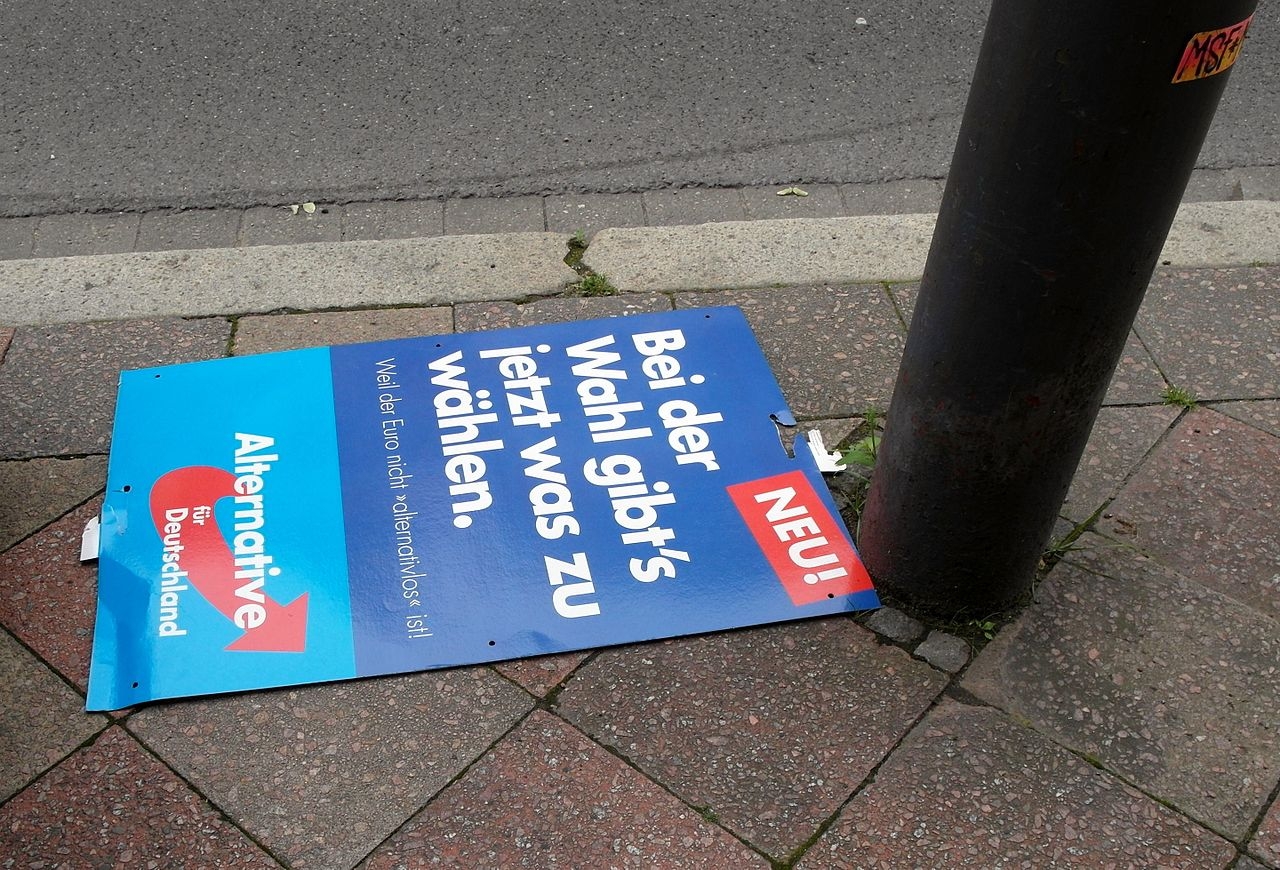Stay at home instead of vote for the right-wing party, Alternative für Deutschland (AfD), is the last-minute advice Chancellor Merkel's chief of staff, Peter Altmaier, is giving to voters ahead of Sunday's election in Germany.
"Better not vote than to vote for the AfD," Merkel's powerful right-hand man told the German newspaper Bild on Tuesday. "The AfD are dividing our country. They are exploiting people's fears. Therefore, I believe that a vote for the AfD cannot be justified.
"These are just a few rabble-rousers who profit from all the reporting on them," he continued, urging the media to stop covering the AfD.
 An AfD campaign poster. Attempts by the German government and the media to smear the far-right party appear to be backfiring. Photo: Wikimedia Commons. |
After 12 years of running the country, Chancellor Merkel and her lieutenant still do not understand real democracy. In a real democracy, the voters hold the elected representatives accountable, not the other way around.
Regardless of what one may think of Altmaier's skewed views, his frustration over the AfD's rising poll numbers is understandable.
Attempts by the German media to smear the AfD and its top leadership in the final stage of election campaign has backfired badly.
Just weeks ahead of the polls, the leading German newspapers produced a flurry of negative stories and hit-pieces portraying the AfD leaders as a bunch of migrant-hating "Islamophobes." Instead of hurting the AfD's electoral prospects, however, the smear campaign has ended up driving more voters toward the party. Even the left-wing British newspaper The Guardian had to admit that "a series of scandals appear to have galvanized rather than weakened the chances of the far-right in next Sunday's election." The AfD could end up becoming the sole and legitimate opposition in the next German parliament, the newspaper added:
Should Merkel and her main challenger, Martin Schulz, agree to continue governing in a "grand coalition" between the two strongest parties, the AfD could lead the opposition in the Bundestag, a role that traditionally carries additional privileges, such as the presidency of the parliament's budget committee.
The AfD, polling around 12 percent in latest polls, is set to become the third largest party in the next German parliament.
Given this momentum, there is a concerted effort underway by members of Merkel's cabinet and the "establishment" parties to portray the AfD's opposition to the Refugee Policy as something unconstitutional or even illegal.
 German Chancellor Angela Merkel's concern over the AfD's rising poll numbers are understandable, but in a democracy, it is the voters who hold their representatives accountable, not the other way around. Photo: Wikimedia Commons. |
At the forefront of this campaign has been Merkel's Justice Minister, Heiko Maas. He has repeatedly urged the German domestic spy agency, Bundesamt für Verfassungsschutz, monitor AfD's functionaries and backers. In the final week ahead of the election, Maas called "several parts of" AfD's election manifesto "illegal."
"The nationalist rhetoric being used by AfD politicians shows that one must assume that an attitude incompatible with Germany's constitution is not only present in the party base but also among its leaders," Martin Schulz, Merkel's present coalition partner and main electoral rival, told the German weekly Der Spiegel earlier this month.
Questioning the AfD's legitimacy on judicial and constitutional grounds has a two-pronged effect. It not only sows doubt in the minds of the undecided voters, but also scares away state employees, law enforcement officers, business owners and even law-abiding citizens from associating themselves with the AfD out of fear of government scrutiny and reprisals.
This political witch-hunt is accompanied by a campaign from the mainstream media to stigmatize support for the AfD.
"To support the AfD publicly in Germany leads to social and economic ostracism. It is almost like admitting to being a witch in the Middle Ages," a German voter was quoted saying by the German broadcaster Deutsche Welle. "I am ashamed that I am not brave enough publicly to support the AfD. But it would be professional suicide and I will never see my grandchildren again," confessed another anonymous German voter.
That fear could explain why more than a third of German voters are still telling pollsters that they are "undecided" -- a surprisingly large number given the high stakes involved in this election. After the Brexit-upset and President Trump's surprise victory, one cannot entirely rule out a hidden AfD vote. If the AfD manages to rope in enough of these undecided voters, pollsters could be in for a September Surprise in this year's critically important election.
Vijeta Uniyal, a journalist and news analyst, is based in Germany.


